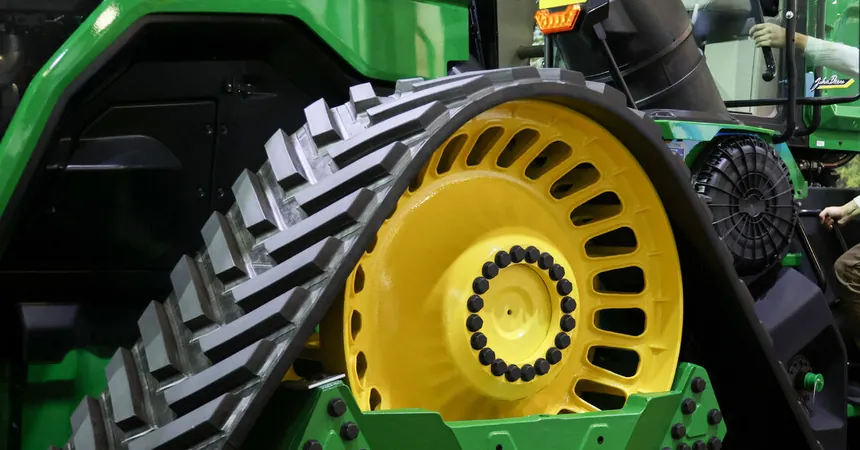
John Deere Faces FTC Lawsuit Over Equipment Repair Restrictions: What You Need to Know!
2025-01-16
Author: Kai
Introduction
In a groundbreaking move, the Federal Trade Commission (FTC) has filed a lawsuit against agricultural giant Deere & Company, widely known for its iconic green-and-yellow products. The lawsuit, initiated on a Wednesday, accuses the company of creating unfair barriers that prevent farmers from conducting their own repairs or using independent repair shops, which has led to skyrocketing costs for farmers across the nation.
Right to Repair Movement
This legal action marks a pivotal moment for the broader 'right to repair' movement, a grassroots campaign advocating for legislation that requires manufacturers to dismantle restrictive practices related to repairs. The FTC's chair, Lina Khan, emphasized the dire implications of such illegal repair restrictions, stating, 'Farmers depend on affordable and timely repairs to harvest their crops and maintain their livelihoods.'
Monopolistic Practices
Deere & Company has increasingly integrated advanced computerized components into its agricultural machinery, limiting access to crucial software tools necessary for repairs. According to the FTC's claim, this monopolistic behavior restricts competition and keeps farmers shackled to higher repair costs imposed by authorized dealers.
Industry Response
In the face of changing legislation advocating for right-to-repair laws – which have already gained traction in various states – manufacturers like John Deere argue that granting wider access to software could pose safety risks and invite intellectual property theft. However, many farmers disagree, claiming these barriers jeopardize their operations and profitability.
Deere's Stance
Upon inquiry, Deere did not respond immediately to the lawsuit. Nonetheless, prior to the filing, the company's vice president of customer support, Denver Caldwell, stated their commitment to enhancing customers' repair capabilities. 'As our equipment has become more technologically advanced, so have the repair tools needed,' he remarked.
Biden Administration's Push
The FTC's lawsuit represents an essential aspect of the Biden administration's push to lower repair costs and diminish time constraints associated with machinery upkeep. In an executive order from 2021 aimed at fostering competition in the U.S. economy, President Biden instructed the FTC to ensure consumers could repair their equipment without undue restrictions imposed by manufacturers.
Scrutiny Over FTC's Actions
Khan's leadership at the FTC has drawn significant scrutiny from corporate entities, especially as the agency broadens its focus to challenge anti-competitive practices across the board. Notably, Harley-Davidson settled an FTC case last year accusing it of unlawfully restricting repair rights for its customers.
Skepticism from Critics
Despite the assurances made by Deere in 2023 through a partnership with the American Farm Bureau Federation to enhance farmers' access to repair resources, critics remain unconvinced. Gay Gordon-Byrne, executive director of the Repair Association, voiced concerns that the company's commitments are largely ineffective without enforcement mechanisms.
Future of the Lawsuit
As the situation unfolds, significant questions linger regarding the lawsuit's trajectory, especially with the potential changes in leadership following the upcoming election. The FTC's decision was not unanimous, with a 3-2 vote indicating a divide among commissioners, including two Republican dissenters.
Legal Challenges
Legal experts like Rutgers University's Michael Carrier emphasize that agriculture has historically seen little antitrust enforcement, complicating predictions for how this case will be navigated by future administrations. However, it remains clear that the push for right-to-repair legislation transcends political affiliations, gathering momentum from all corners of society—farmers, advocates, and consumers alike.
Conclusion
As this drama continues to unfold in court, it’s crucial for stakeholders to stay informed about the developments that may reshape repair rights, consumer choices, and agricultural practices for years to come!



 Brasil (PT)
Brasil (PT)
 Canada (EN)
Canada (EN)
 Chile (ES)
Chile (ES)
 Česko (CS)
Česko (CS)
 대한민국 (KO)
대한민국 (KO)
 España (ES)
España (ES)
 France (FR)
France (FR)
 Hong Kong (EN)
Hong Kong (EN)
 Italia (IT)
Italia (IT)
 日本 (JA)
日本 (JA)
 Magyarország (HU)
Magyarország (HU)
 Norge (NO)
Norge (NO)
 Polska (PL)
Polska (PL)
 Schweiz (DE)
Schweiz (DE)
 Singapore (EN)
Singapore (EN)
 Sverige (SV)
Sverige (SV)
 Suomi (FI)
Suomi (FI)
 Türkiye (TR)
Türkiye (TR)